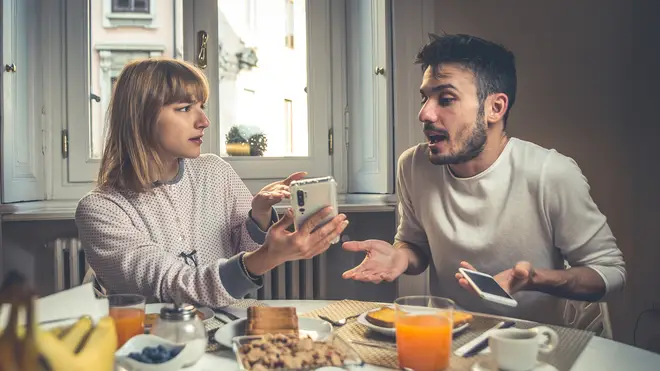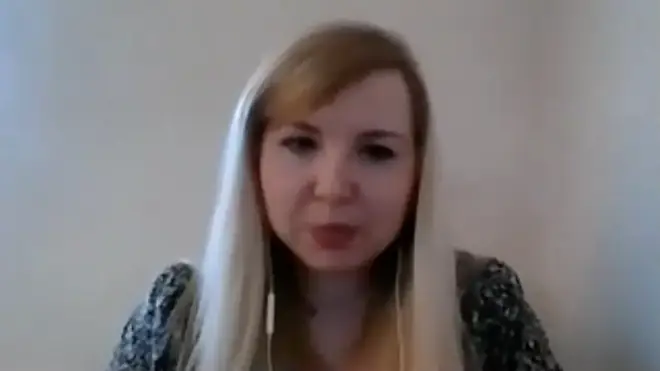
Nick Abbot 12am - 1am
8 February 2021, 11:28 | Updated: 8 February 2021, 13:13

Conspiracy theories and fake news have risen in prominence during the Covid-19 crisis, damaging efforts to tackle the virus - so what is the best way to talk to friends or family who believe in them?
Misinformation about Covid-19 has been widespread throughout the pandemic, with conspiracy theories ranging from the disease being man-made, to the virus being spread via 5G phone masts.
While elements of fake news have been discussed by the mainstream media, most stories are conceived and circulated online, where they can often go unchecked.
With algorithms controlling what people see on social media, false information with no evidence can be rapidly shared with thousands of people and end up dominating their news feeds.
Speaking with LBC, Pippa Allen-Kinross, the acting deputy editor of Full Fact - the UK’s independent fact-checking charity - said it is natural for people to question information during such unique and difficult times.
But as alternative explanations creep into people's lives, what is the best way to counter them? And how should you talk to loved ones about coronavirus conspiracy theories?

The first and most important advice for talking to loved ones about Covid conspiracy theories is to stay calm, Ms Allen-Kinross told LBC.
"Getting into a heated, emotional argument isn’t going to be helpful," the Full Fact acting deputy editor said.
"It’s probably going to make them quite defensive, so you’re not likely to break through."
Being open and listening to a friend or family member, even if they are among the more "hardcore" believers, is imperative if you are to eventually reach through to them.

How to talk to loved ones who believe Covid conspiracy theories
Although many coronavirus conspiracy theorists are sceptical about information from official organisations, it is vital to continue pointing them towards these sources, such as the NHS, the Office for National Statistics (ONS) and the World Health Organisation (WHO).
It is also helpful to ask your friend or loved one whether they have seen their 'information' in the mainstream media. For example, if the vaccine really was killing people, it would probably make the news.
"If it hasn’t been reported in the mainstream media, then it's probably something that hasn’t happened because you would have heard about it," Full Fact told LBC.
"It’s important to lay out the facts and let people see for themselves what information can be trusted."
Ms Allen-Kinross added: “It may be that some people, the more hardcore conspiracy theorists, may not trust the official sources of information, but that is the best thing you can do – to try and show them what the actual truth is."

How to talk to hardcore conspiracy theorists in the family
It is incredibly important not to patronise your friend or family member when talking to them about Covid conspiracies.
"No-one likes to feel that they’re stupid and a lot of conspiracy theories can actually be quite convincing. So making someone feel stupid isn’t a good way to address them," Ms Allen-Kinross told LBC.
Whether you're speaking with someone who has a healthy level of doubt towards official information or someone who completely denies the truth, it is crucial "to be respectful and understanding".

Should you talk to a loved one about Covid conspiracies face-to-face?
Talking to a loved one about coronavirus conspiracy theories can be a daunting prospect. But anyone can have 'the conversation' with someone who has fallen down these rabbit holes.
“If you’re comfortable talking to friends and family members about these things then it can be helpful but there isn’t an onus on anybody to do that," Ms Allen-Kinross said.
The chat does not necessarily have to be face-to-face either.
“It’s more about the way you approach the chat rather than the physical aspect of it," the Full Fact acting deputy editor added.
"If what you’re trying to do is disprove quite a complicated conspiracy theory and you want to send them a lot of information, then giving them the time to digest what you’re trying to say would be more helpful than immediately having a back and forth and demanding that they see your point of view."

Should you encourage a loved one to give up their phone or social media?
Although social media is a hotbed for conspiracy theories about coronavirus, it is not necessary for people to shun their phones, Facebook or Twitter.
However, it is important to remind a friend or family member to look at anything shared on these platforms with a critical eye.
"Just because something’s been shared by a thousand people, it doesn’t mean that the information there is right," Ms Allen-Kinross told LBC. "Just because you get a message that’s been forwarded by a lot of people on WhatsApp, doesn’t mean that the information is right."
Therefore, people should always ask themselves, "Do I trust this?" before forwarding posts on to anyone else.

What to do if you've lost all hope for a loved one who believes in Covid conspiracy theories
“If someone has given up hope on their loved ones who are believing conspiracy theories, then it’s a really difficult thing to have to deal with," Ms Allen-Kinross told LBC.
"It can be really hard to accept that someone you care about and trust is sharing information that you think is harmful."
As the pandemic continues, and with it Covid conspiracies theories, there could be a piece of evidence or news story that finally changes a friend or family member's mind.
"I wouldn’t say you should fully give up hope on people," the Full Fact acting deputy editor said.
"There is a lot of hope that things are going to change and that maybe people - with some new information, or some distance from the anxiety and pressure of the current situation - will start to see things in a different way."
Listen & subscribe: Global Player | Apple Podcasts | Google Podcasts | Spotify